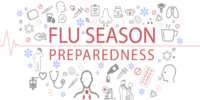Seniors and Influenza: Navigating Risks and Enhancing Immunity

Are you a senior trying to navigate the risks of influenza and enhance your immunity? This article is here to help.
Influenza can have a significant impact on seniors, but there are steps you can take to prevent it and manage its symptoms. Vaccination is key, but there are also natural approaches to boosting immunity.
Early detection and treatment are crucial, and caregivers can play a vital role in supporting seniors with influenza.
So, let’s dive in and explore how you can protect yourself and stay healthy.
Key Takeaways
- Seniors are vulnerable to the flu due to weakened immune systems and underlying health conditions.
- Preventive measures like vaccination and good hygiene reduce the impact on health and healthcare system.
- Annual flu vaccination is crucial for seniors as it is effective in preventing illness and complications.
- Early intervention prevents complications and ensures faster recovery for seniors with influenza.
Understanding the Impact of Influenza on Seniors
You should know that influenza can have a significant impact on seniors’ health and well-being.
Seniors are particularly vulnerable to the effects of the flu due to their weakened immune systems and underlying health conditions.
When an elderly person contracts the flu virus, it can lead to severe complications such as pneumonia, hospitalization, and even death.
The impact on healthcare is substantial, as hospitals and medical facilities often experience a surge in admissions during flu season, resulting in increased strain on resources and healthcare providers.
The cost of treating influenza in seniors is also significant, with healthcare expenses rising due to hospital stays, medications, and follow-up care.
It is crucial for seniors to take preventive measures such as getting vaccinated and practicing good hygiene to reduce their risk of contracting the flu and minimize the impact on their health and the healthcare system.
Common Risks and Complications for Senior Citizens
Be aware of the common risks and complications that can affect senior citizens during flu season. As you age, your immune system becomes weaker, making you more susceptible to the flu virus. Here are three important things to keep in mind:
- Higher prevalence rates: Senior citizens have a higher risk of contracting the flu compared to other age groups. The prevalence rates among seniors are significantly higher, increasing the likelihood of exposure and infection.
- Underlying conditions: Many seniors have pre-existing health conditions such as heart disease, diabetes, or respiratory issues. These underlying conditions can make the flu more severe and lead to complications like pneumonia or worsening of chronic diseases.
- Decreased vaccine effectiveness: Due to a weaker immune response, seniors may not develop the same level of protection from the flu vaccine as younger individuals. This means that even if you get vaccinated, you may still be at risk of getting sick.
Tips for Preventing Influenza in the Senior Population
Take note of these helpful tips to prevent the flu in the senior population. As we age, our immune system weakens, making us more susceptible to infections like the flu. To protect yourself and your loved ones, it is important to practice good hygiene and get vaccinated annually. Here are some simple yet effective measures you can take:
| Tips for Preventing Influenza |
|---|
| Wash your hands frequently |
| Avoid close contact with sick individuals |
| Cover your mouth and nose when coughing or sneezing |
| Clean and disinfect commonly touched surfaces |
| Stay home if you’re feeling unwell |
| Get vaccinated |
Vaccination: the Key to Protecting Seniors From Influenza
Make sure to get vaccinated against the flu every year to protect yourself and others in the senior population. Vaccination is the key to preventing influenza and reducing its prevalence among seniors.
The flu vaccine has been proven to be effective in preventing illness and complications related to the flu. It stimulates your immune system to produce antibodies that fight against the influenza virus.
By getting vaccinated, you not only protect yourself but also contribute to the overall health of the senior population.
Influenza can be particularly dangerous for older adults, as they are more susceptible to severe illness and complications. Therefore, it is crucial to prioritize vaccination as a proactive measure in safeguarding against the flu and keeping the senior community healthy.
Boosting Immunity in Older Adults: Natural Approaches
Did you know that incorporating a balanced diet rich in vitamins and minerals, along with regular exercise, can help strengthen your immune system as you get older?
As an older adult, it is essential to pay attention to your nutrition and boost your immunity naturally. Elderly nutrition plays a vital role in maintaining a strong immune system.
Make sure to include foods that are high in antioxidants, such as fruits, vegetables, and whole grains. Additionally, herbal remedies can also be beneficial in enhancing your immunity. Herbs like echinacea, garlic, and ginger have been used for centuries to support the immune system. However, it is essential to consult with a healthcare professional before incorporating any herbal remedies into your routine.
Recognizing and Managing Influenza Symptoms in Seniors
Are you aware of the signs and symptoms of the flu that you should be on the lookout for? When it comes to managing symptoms and providing senior care, recognizing and addressing influenza symptoms in older adults is crucial.
Seniors are at a higher risk of developing severe complications from the flu, so it’s important to be vigilant. Common symptoms of the flu in seniors include fever, cough, sore throat, body aches, fatigue, and sometimes diarrhea and vomiting.
If you or a loved one experience these symptoms, it’s essential to seek medical attention promptly. Timely intervention can help manage symptoms and prevent complications.
Additionally, seniors should receive the flu vaccine each year to reduce the risk of getting infected. Remember, early recognition and proper management of flu symptoms are essential in providing the best care for seniors.
The Importance of Early Detection and Treatment for Seniors
Don’t underestimate the significance of detecting and treating symptoms early in order to provide the best care for yourself or your loved ones. Early intervention plays a crucial role in managing influenza in seniors. By recognizing the signs of infection and seeking medical attention promptly, you can prevent complications and ensure a faster recovery. Access to healthcare is vital for timely diagnosis and treatment. Unfortunately, not everyone has equal access to medical services, which can hinder early intervention. This inequity in healthcare access highlights the need for policies and programs that prioritize vulnerable populations, like seniors, and ensure they receive the care they deserve. Take a look at the table below to understand the emotional impact of delayed intervention:
| Early Intervention | Delayed Intervention |
|---|---|
| Timely recovery | Complications |
| Peace of mind | Anxiety |
| Reduced hospitalizations | Increased healthcare costs |
| Improved quality of life | Decreased productivity |
Supporting Seniors With Influenza: Caregiver Strategies
Supporting seniors with the flu requires you, as a caregiver, to provide comfort and assistance throughout their recovery. Caregiver support plays a crucial role in helping seniors navigate the challenges of influenza.
To prevent the flu, make sure you encourage seniors to get vaccinated annually and practice good hygiene, such as regular handwashing.
If your loved one does contract the flu, there are several ways you can support them. Ensure they have plenty of fluids and nutritious meals to aid their recovery. Offer comfort and reassurance, as the flu can be physically and emotionally draining. Help them manage their symptoms by providing over-the-counter medications as recommended by their healthcare provider.
Frequently Asked Questions
Can Seniors Get the Flu Even if They Have Been Vaccinated?
Yes, seniors can still get the flu even if they’ve been vaccinated. The flu vaccine’s effectiveness varies each year due to different flu strains. It’s important to take additional preventative measures to reduce the risk of getting sick.
What Are Some Natural Remedies to Boost Immunity in Older Adults?
To naturally boost your immunity, try incorporating immune-boosting foods like citrus fruits and garlic into your diet. Additionally, consider holistic approaches such as herbal supplements and lifestyle changes like regular exercise and adequate sleep.
How Can Caregivers Protect Themselves From Getting the Flu While Caring for Seniors?
To protect yourself from the flu while caring for seniors, take preventive measures. Follow good hygiene practices like washing hands frequently, wearing a mask, and getting vaccinated. These strategies can reduce the risk of contracting the flu.
Are There Any Specific Symptoms of the Flu That Are More Common in Seniors?
Common flu symptoms in seniors include fever, cough, sore throat, body aches, and fatigue. Older adults are at higher risk for severe flu due to weakened immune systems, chronic health conditions, and decreased lung function.
What Are the Long-Term Effects of Influenza on Seniors’ Health?
The long-term effects of influenza on your health can be serious, especially in the elderly population. Complications like pneumonia, heart problems, and worsening of existing conditions can occur, making it important to take preventive measures.









